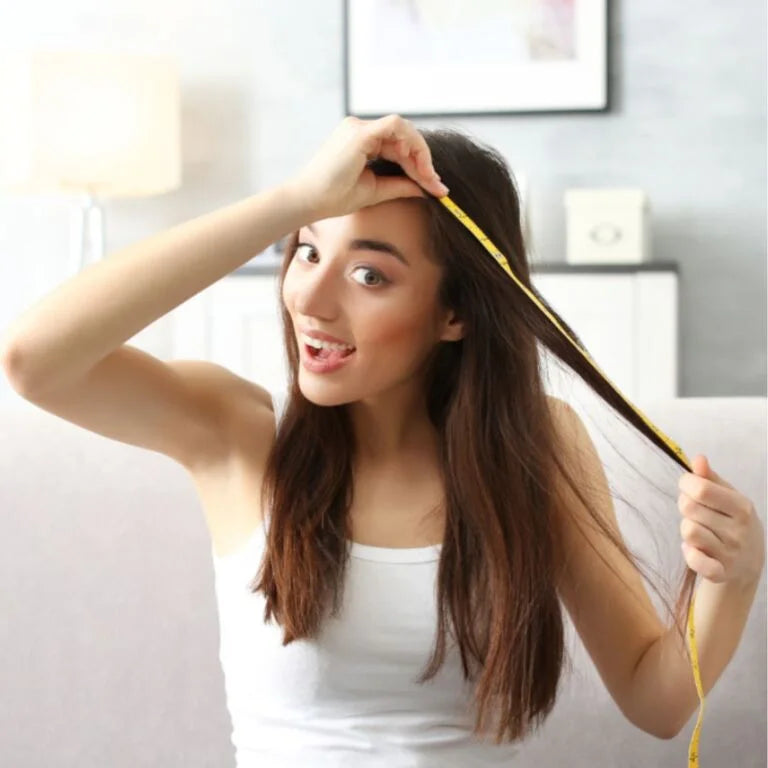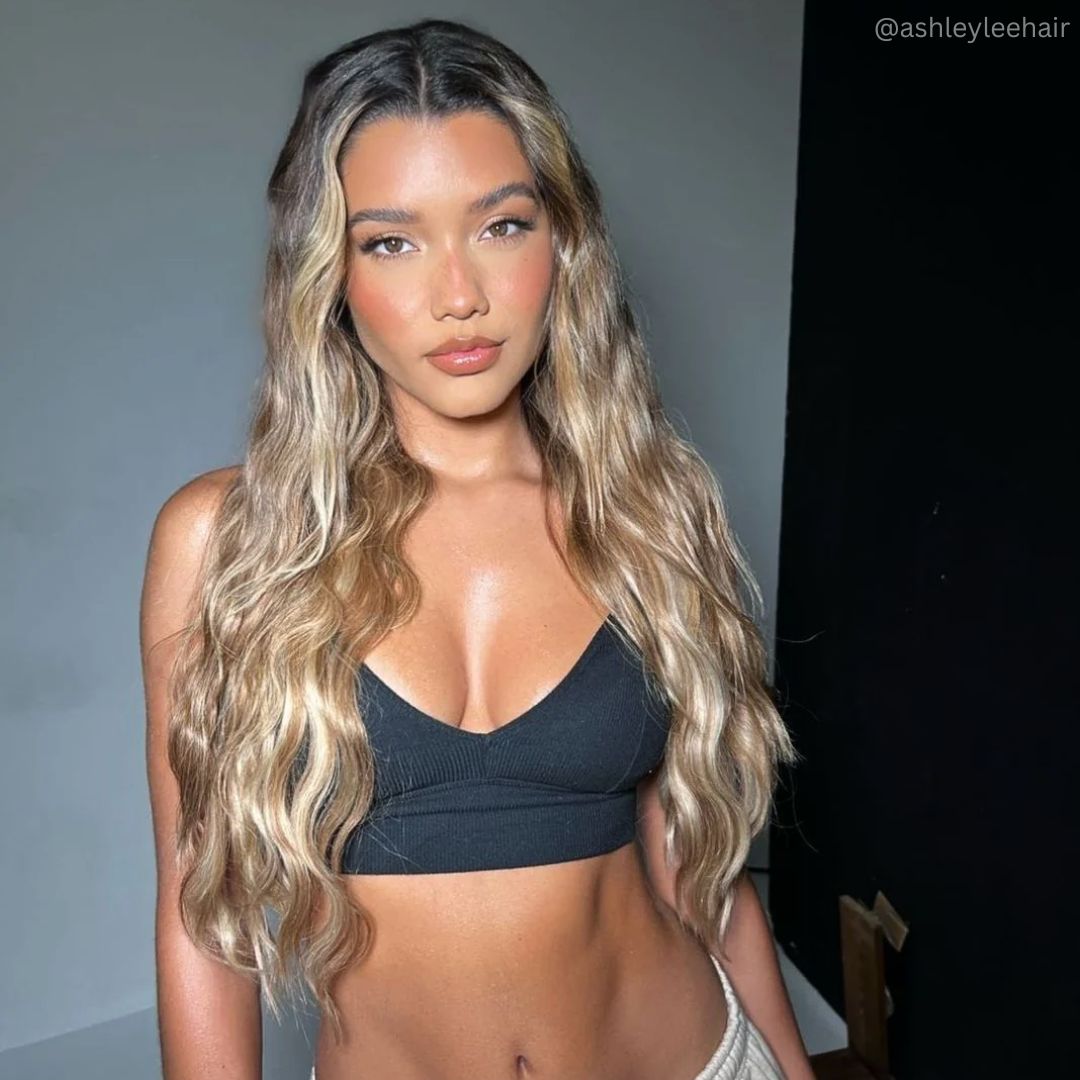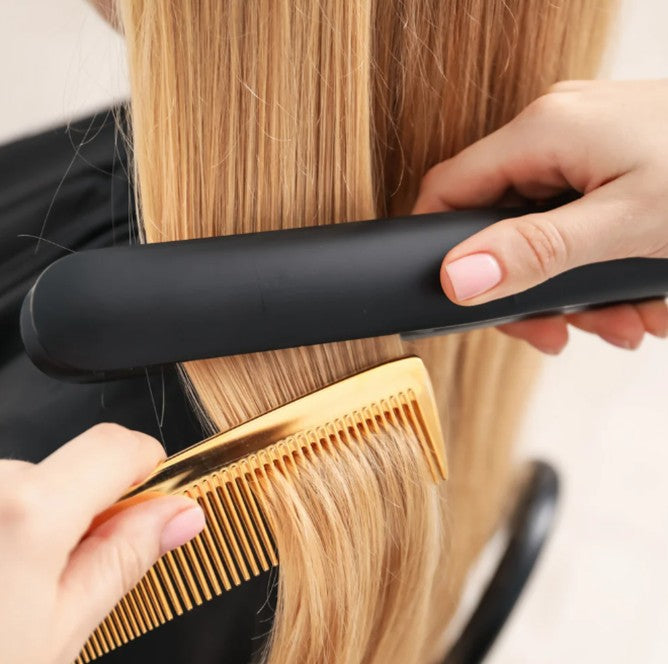Can Hair Extensions Cause Acne? Here's What To Know
by BRENDA L. / AUG 1, 2023

Reading Time: 5 Minutes
Index
Being an easy purchase to make online or at your favorite hair salon, hair extensions have noticeably grown in popularity over the past years. You can use them to switch things up for a special occasion, to recreate a colorful look for a festival, to temporarily boost your mane as you go through hormonal changes and/or health issues impacting your hair’s appearance, or even to look extra glamorous in your day-to-day life.
However, as with any cosmetic enhancement and beauty treatment, sometimes even something as simple as wearing hair extensions can come with potential side effects. One of the most common? Well… Acne and skin breakouts. Is there a correlation between wearing hair extensions and skin breaking out? How can you prevent this from happening, and if this has already happened to you: how can you treat your skin and scalp after noticing the few signs of acne?
In today’s blog, we will delve into this phenomenon in detail, and provide you with everything you need to know about it.
Understanding Hair Extensions
Hair extensions are available on the market in tow formats: human or synthetic. Whilst at Cliphair we only deal with 100% Remy human hair, not every company does this – so you better do your research before purchasing! Generally speaking, human hair extensions are available in a lot of different types to meet the needs of every customer, but the main categories are: clip in hair extensions, and permanent hair extensions.
Human hair extensions are usually more costly, but make an efficient, natural-looking and long-lasting investment – whereas synthetic hair extensions are often quite obvious, standing out against real hair. Depending on what you need to achieve and your budget, they can both be valid options – however, we don’t encourage the use of synthetic hair extensions in general as not everyone’s scalp reacts so well to them.
Do Hair Extensions Cause Acne?
While hair extensions themselves do not directly cause acne, there are factors associated with their application and maintenance that can indeed be challenging to your skin and scalp, contributing to acne breakouts on your forehead, scalp, hairline, and other areas on your face. Let’s see them together:
Trapped Dirt and Oil: especially when getting permanent hair extensions fitted on, such as nano ring hair extensions or tape in hair extensions, people tend to be more wary of how they wash their hair. This can lead to a build up of natural oil produced by your scalp (sebum), on top of product residues, sweat, and more. In the long run, the build up can clog your pores, favouring acne breakouts. If you are unsure about how and how often you should wash you hair when wearing hair extensions, speak to your hair stylist. Also, make sure that you opt for the type of hair extensions that is more compatible with your hair and scalp type! For example, those with oily hair are usually not recommended to wear tape hair extensions.
Tension and Friction: if your stylist has improperly installed the extensions, this can cause tension in your scalp, causing irritation and inflammation. If you have sensitive skin, an unwanted reaction is more likely to come to the surface. Be careful when choosing a hair extensions technician; always check their reviews and if possible ask to see some of their previous work. Tensions, friction and pulling on your scalp are no joke, and they are all factors that can possibly lead to traction alopecia as well – we’re talking hair loss! Find out more about how to choose a new salon in our dedicated blog: How To Find A New Hair Salon.
Allergic Reactions: some people may be particularly sensitive to some of the materials used when applying certain types of hair extensions, such as adhesive tapes, or metals in clips. Speak to your hair stylist first, and discuss together all the possible patch tests you may need to undergo before your fitting appointment. In some cases, an allergic reaction’s symptoms can include acne-like responses, skin inflammations, and more serious complications. If you are aware of your allergies, always make sure you tell your hair stylist!
Incorrect Care and Maintenance: in the case of certain types of hair extensions such as with sewn-in weaves, incorrect after-care can lead to bacterial growth, and even mouldy hair extensions. This can have a taxing effect on your skin and scalp, and one of the consequences you may face is acne.
Synthetic Material: in some cases, people using synthetic hair extensions have noticed the arrival of acne-like symptoms on their face and scalp pretty quickly. This may be due to the material of your hair extensions not being natural, causing tiny abrasions on your scalp, or generally having a suffocating effect on your skin.
Tips for Preventing Acne with Hair Extensions
There are several precautions that you can take to make sure that your hair extensions only serve their original purpose – aka, looking fab – rather can coming up with a series of unwanted side effects.
Choose High-Quality Extensions: first and foremost, always opt for high-quality, natural hair extensions. My opinion might be biased, but I would never trade Remy human hair extensions for synthetic. Not only they don’t look and perform the same, but synthetic hair makes my scalp itch like I was ridden with fleas, although some other people didn’t have the same reaction. To each their own, I guess, but also: better safe than sorry!
Maintain Good Hygiene: regularly wash and condition your tresses and scalp to prevent the accumulation of oil, sweat, and dirt. Make sure you always use sulfate-free shampoo and conditioner, and avoid overusing styling products et similia near the scalp. Want to know more? Check out our How To Wash Hair Extensions guide.
Ensure Proper Installation: have your hair extensions professionally installed by a skilled stylist who understands the importance of not applying excessive tension on the scalp.
Give Your Scalp Breathing Time: avoid wearing clip in hair extensions continuously for extended periods of time, and give your scalp a break! If you’re wearing permanent hair extensions as well, speak to your stylist about re-fitting appointments and what to do in between.
Avoid Touching Your Face: this doesn’t go only for extensions wearers, but generally speaking the less you’re touching your face and forehead, as the oils and dirt from your hands can exacerbate acne issues.
Choose Suitable Hairstyles: switch things up with your looks by opting for hairstyles that minimise contact between the extensions and your skin, such as loose braids, messy buns, or ponytails.
Conclusion
So, what have we learned today? While hair extensions per se are not known to cause acne and skin breakouts, the way they are applied, maintained and interact with your skin and scalp can contribute to skin reactions. Make sure you follow all the proper aftercare steps and always keep them clean and tidy in order to avoid any nasty surprises. If you experience persistent skin issues, consult a dermatologist to address your concerns.
Looking for flawless, salon-worthy hair without breaking the bank? At Cliphair, we’ve got you covered with luxurious clip in hair extensions for quick transformations and permanent hair extensions for long-lasting glam. Extensions require special care and maintenance to preserve their quality, which is why we have all the top-notch hydrating haircare products needed to keep your style on point.
Need the perfect shade? Browse our full range of human hair extensions in over 70 rich, silky shades or check out our FREE Express Color Match Service to ensure a seamless blend every time.






